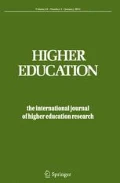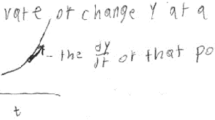Abstract
Previous research on student learning has established the importance of the constrasting conceptions of learning held by students, and of the distinction between deep and surface approaches to learning. It has also shown that the outcome of learning may be described in terms of qualitatively different levels and that different forms of examination encourage different levels of answer. Within all these studies the nature of the understanding which is developed has been rather taken for granted. In this essentially exploratory study, a detailed examination of the interview transcripts of 13 students, who had just completed their final degree, was supplemented by analyses of written responses from an additional 11 students in their final undergraduate year. In the interviews, the students were asked about the revision strategies they had adopted and their attempts to develop understanding, and aspects of these were explored further through the written responses. Analyses of both interviews and written responses indicated the existence of differing forms of understanding which parallel, to some extent, the conceptions of learning identified previously. Links were also explored between the revision strategies adopted and the forms of understanding reached. Implications of the findings suggest that traditional degree examinations do not consistently test deep, conceptual understanding. It appears that some students gear their revision to question types which can be answered within frameworks provided by the lecturer or a textbook and that the type of questions set has a strong influence on the forms of understanding students seek during their studying and their revision. Some types of question encourage, and test, a restricted form of conceptual understanding. It also seems that the particular types of structure used in a lecture course to provide a framework also has an important influence on the ease with which students can relate it to other courses and also develop their own understanding.
Similar content being viewed by others
References
Biggs, J. B., and Collis, K. E. (1982). Evaluating the Quality of Learning: The SOLO Taxonomy. New York: Academic Press.
Cole, N. (1990). ‘Conceptions of educational achievement’, Educational Researcher 19, 2–7.
Coles, C. (1990). ‘Helping students with learning difficulties in medical and health-care education’, Medical Education 24, 300–312.
Eizenburg, N. (1988). ‘Approaches to learning anatomy: developing a programme for preclinical medical students’, in Ramsden, P. (ed.), Improving Learning: New Perspectives. London: Kogan Page, pp. 178–198.
Entwistle, N. J. (1974). ‘Complementary paradigms for research and development work in higher education’, in Verreck, W. A. (ed.), Methodological Problems in Research and Development in Higher Education. Amsterdam: Swets & Zeitlinger.
Entwistle, N. J. (1975). ‘How students learn: information processing, intellectual development, and confrontation’, Higher Education Bulletin 3, 129–148.
Entwistle, N. J. (1984). ‘Contrasting perspectives on learning’, in Marton, F., Hounsell, D. J., and Entwistle, N. J. (eds.), The Experience of Learning. Edinburgh: Scottish Academic Press, pp. 36–55.
Entwistle, N. J. (1987). ‘A model of the teaching-learning process’, in Richardson, J. T. E., Eysenck, M. W., and Warren Piper, D. (eds.), Student Learning: Research in Education and Cognitive Psychology. London: S. R. H. E./Open University Press, pp. 13–28.
Entwistle, N. J. (in press). ‘Influences on the quality of student learning: implications for medical education’, South African Medical Journal.
Entwistle, N. J., and Entwistle, A. (1991). ‘Conceptions of understanding in the revision process’. Paper presented at the Fourth Conference of the European Association for Research on Learning and Instruction, Turku, 24th–28th August, 1991.
Entwistle, N. J., and Marton, F. (1984). ‘Changing conceptions of learning and research’, in Marton, F., Hounsell, D. J., and Entwistle, N. J. (eds.), The Experience of Learning. Edinburgh: Scottish Academic Press, pp. 211–228.
Entwistle, N. J., and Percy, K. A. (1974). ‘Critical thinking or conformity: an investigation of the aims and outcomes of higher education, in Research into Higher Education, 1973. London: SRHE.
Entwistle, N. J., and Ramsden, P. (1983). Understanding Student Learning. London: Croom Helm.
Entwistle, N. J., and Tait, H. (1990). ‘Approaches to learning, evaluations of teaching, and preferences for contrasting academic environments’, Higher Education 19, 169–194.
Marton, F. (1981). ‘Phenomenography: describing conceptions of the world around us’, Instructional Science 10, 177–200.
Marton, F., Dall'Alba, G., and Beaty, E. (1991). ‘Conceptions of learning’, International Journal of Educational Research 14, in press.
Marton, F., Hounsell, D. J., and Entwistle, N. J. (eds.) (1984). The Experience of Learning. Edinburgh: Scottish Academic Press. Copies of The Experience of learning may now be obtained from the Centre for Research on learning and instruction at the address given on the first page of the article at £ 10 (£ 12.50 overseas).
Marton, F., and Säljö, R. (1976). ‘On qualitative differences in learning. I - Outcome and process’, British Journal of Educational Psychology 46, 4–11.
Marton, F., and Säljö, R. (1984). ‘Approaches to learning’, in Marton, F., Hounsell, D. J., and Entwistle, N. J. (eds.), The Experience of Learning. Edinburgh: Scottish Academic Press, pp. 36–55.
Miller, C. M. L., and Parlett, M. R. (1974). Up to the Mark: A Study of the Examination Game. Guildford: Society for Research into Higher Education.
Peel, E. A. (1971). The Nature of Adolescent Judgement. London: Staples.
Pollitt, A. B., Hutchinson, C., Entwistle, N. J., and de Luca, C. (1985). What Makes Exam Questions Difficult? Edinburgh: Scottish Academic Press.
Prosser, M., and Millar, R. (1989). ‘The ‘how’ and ‘why’ of learning physics’, European Journal of the Psychology of Education IV, 513–528.
Renstrom, L. (1989). Conceptions of Matter: A Phenomenographic Approach. Gothenburg: Acta Universitatis Gothoburgensis.
Säljö, R. (1979). ‘Learning in the learner's perspective. I - Some commonsense conceptions’. Reports from the Department of Education, University of Gothenburg.
Sutherland, P. (1982). ‘An expansion of Peel's describer-explainer theory’, Educational Review 34, 69–76.
Svensson, L. (1977). ‘On qualitative differences in learning. III - Study skill and learning’, British Journal of Educational Psychology 47, 233–243.
Svensson, L. (1974). ‘Skill in learning’, in Marton, F., Hounsell, D. J., and Entwistle, N. J., (eds.), The Experience of Learning. Edinburgh: Scottish Academic Press, pp. 56–70.
Thomas, P. (1986). ‘The Structures and Stability of Learning Approaches’. Unpublished Ph.D. thesis, University of Queensland, Australia.
Thompson, S., Tait, H., and Entwistle, N. J. (in press). Guidelines for Promoting Effective Learning in Higher Education. University of Edinburgh: Centre for Research on Learning and Instruction.
Van Rossum, E. J., Deikers, R., and Hamer, R. (1985). ‘Students' learning conceptions and their interpretation of significant educational concepts’, Higher Education 14, 617–641.
Author information
Authors and Affiliations
Rights and permissions
About this article
Cite this article
Entwistle, N.J., Entwistle, A. Contrasting forms of understanding for degree examinations: the student experience and its implications. High Educ 22, 205–227 (1991). https://doi.org/10.1007/BF00132288
Issue Date:
DOI: https://doi.org/10.1007/BF00132288




